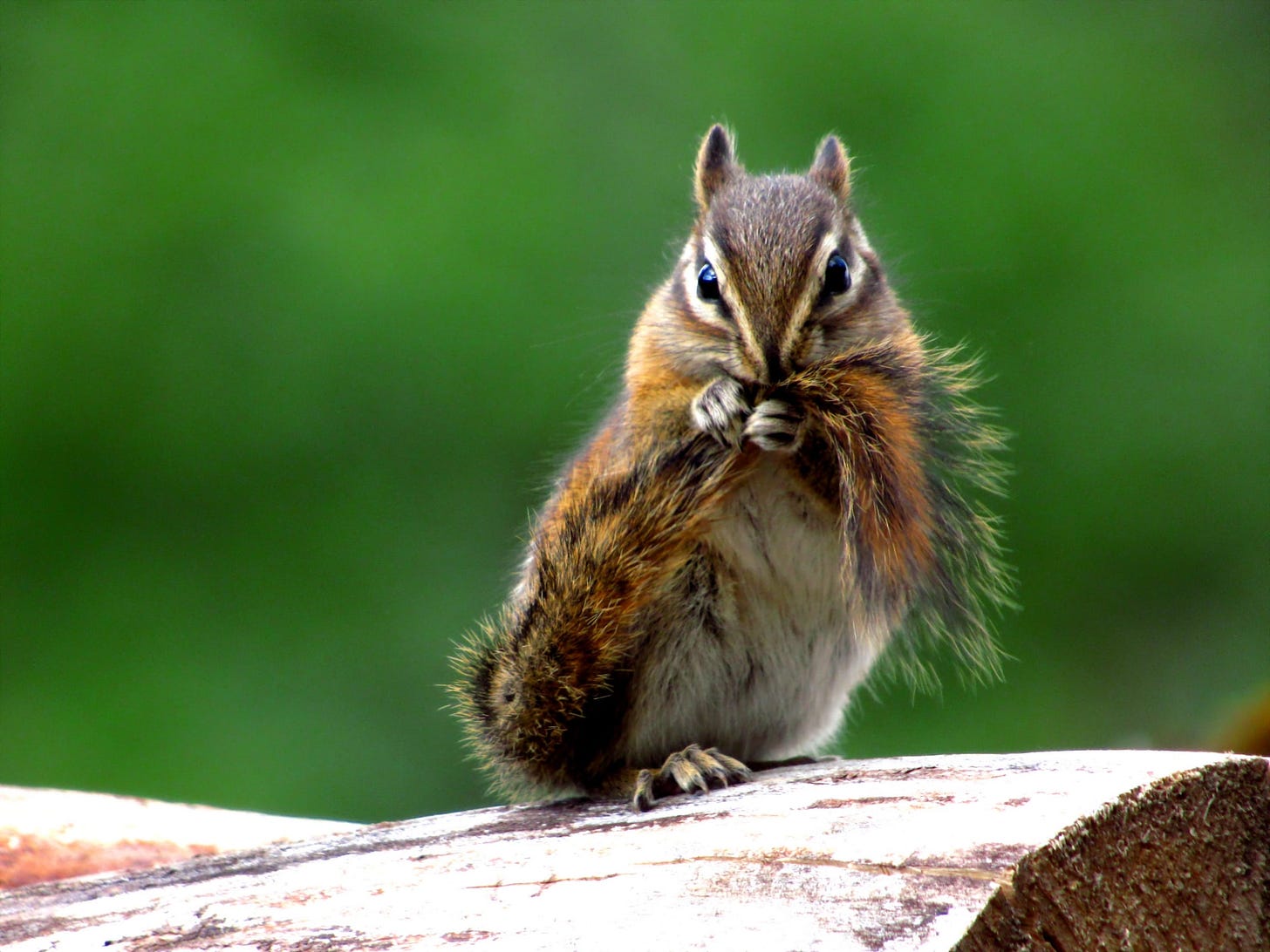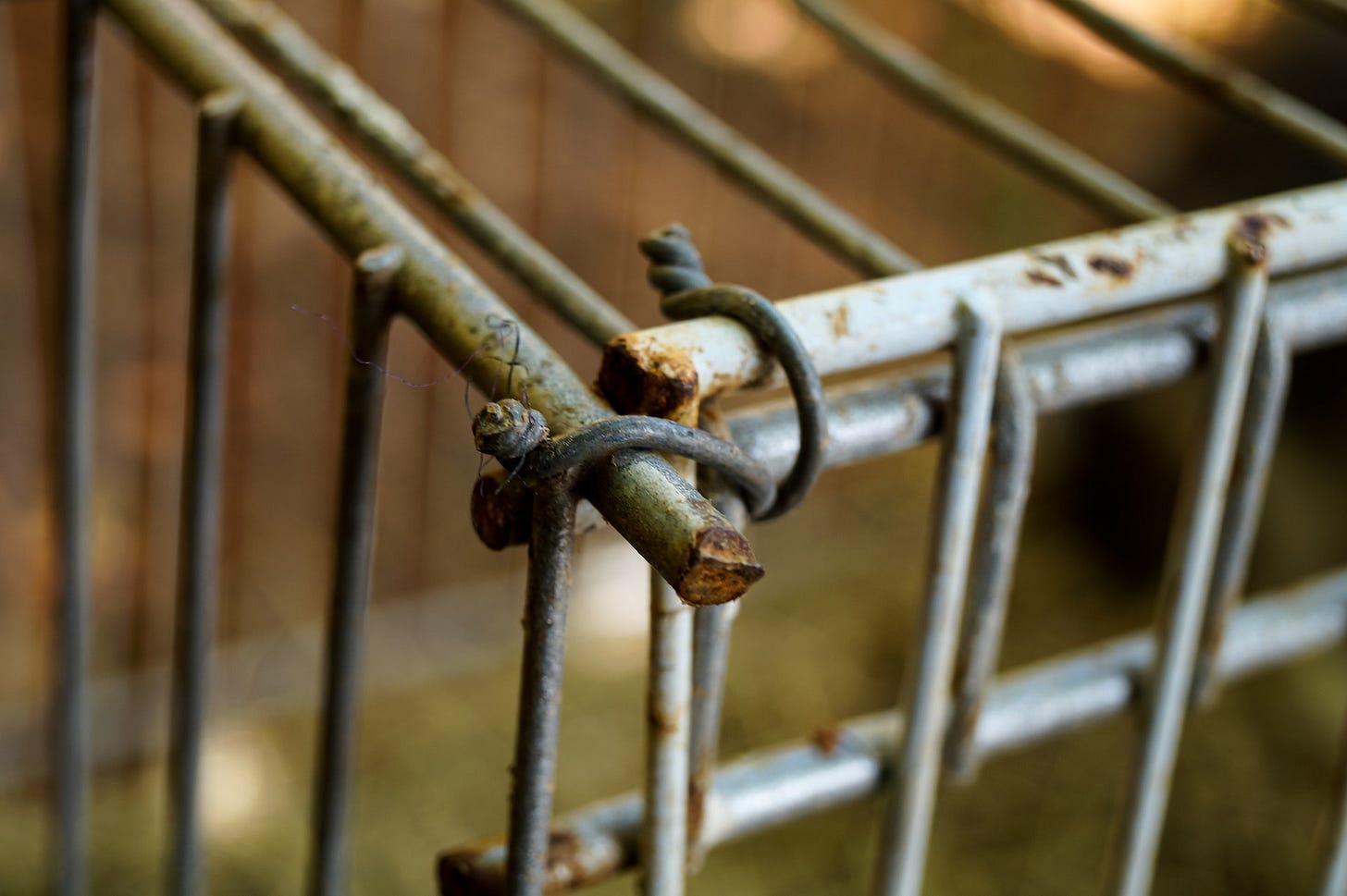As I approached the cage, I thought, Damn, the little devil sprang the trap without getting caught again.
It had happened several times that the doors of the traps I’d set out had slammed shut on empty cages. I would find them like that and wonder how a chipmunk could do it. Sometimes the bait would be gone, too.
So I began to use those little plastic cups in which the Chinese take-out place sends sauces out into the world. I punched holes in the lids so the aroma of the toasted nuts I put inside would entice a chipmunk, and in its struggle to get at the bait it would trip the catch.
That was the theory, anyway, and it worked more often than not. As of yesterday, I had trapped forty-eight chipmunks over the summer, releasing them in a place more suited to their burrowing habits than the retaining wall intended to keep my front steps in place, and more tolerant of their piercing shrieks, which they emit from sunup to sundown all summer long, rendering afternoon naps or a morning sleep-in impossible.
Forty-eight of them, live-trapped and released, their numbers marched forward with the days on the wall calendar on which I tracked their departures. June 10: seventeen chippies. July 30: thirty-one chippies. One day in August there was a special on them, and I found two in one trap. I gloated over my success.
Ethnic cleansing, a friend called it. “What effect do you think it has on the chipmunk,” she asked me, “when you release it in unfamiliar territory?”
“I don’t care,” was my callous response. “It’s out of my yard.”
So I had grown accustomed to approaching the traps to check, finding either an empty trap—sprung or un-sprung—or hearing first silence and then scampering noises that increased as I came closer, the tiny black-striped furry creature racing back and forth faster as I approached.
“Don’t worry, little fellow,” I would comfort it. “You’ll love your new home. Lots of woods, a lovely stream, and all those friends you thought had gone missing.”
Then for two weeks in September the traps remained empty and un-sprung. Had I caught them all? It seemed a shame to end the season at forty-eight when fifty was so close.
And then yesterday there was a new hole in the mulch beside the steps. “Aha!” I said to the unseen inhabitants. “I’ll get you!”
This morning I went to check on the trap. The silence and the sight of the closed door fooled me, and I thought the bait cup trick had failed. But as I bent over the trap I saw, curled into a ball and shivering, a small body. It barely reacted when I picked up the trap and held it aloft.
Odd, I thought, catching sight of a foot sticking out between the metal cross-wires; why doesn’t it pull its leg in?
I looked closer. An image came to me of the appetizer I’d been served once in a restaurant, tiny quail drumsticks crossed on a bed of radicchio and lettuce mâche, the infinitely slender ankle bones intersecting. The chipmunk’s broken leg, bone exposed, looked much like one of those delicate ankles.
Disbelief is what I remember feeling first, and a sense of unreality. “But I’ve trapped forty-eight already, and they’ve all been fine!” I said aloud.
“This one is not fine,” I responded. “This one is in shock, badly wounded, and suffering. It’s half dead already.”
Irrational thoughts of calling my cat’s veterinarian, known to have a kind heart toward raccoons and other suburban wildlife, were dismissed, and I began to explore mentally how I could best put the little creature out of the misery it wouldn’t be in but for me.
“Are you sure you can’t release it like the others?”
“No, it would only suffer longer before it died; look at it.”
“Maybe take it out of the trap and crush it with a rock?”
“Too gory, and it might get away and suffer for hours before it died.”
“Drowning, then.”
As soon as I thought of drowning, the deed was real. I knew I would have to do it. My throat tightened against tears, and my brain clamped down to disallow any feeling. Using only mind, I focused on the concept of compassion so that I could complete the task.
“Bucket?”
“Not big enough; better not to try and take it out of the trap.”
“Something big enough for the trap too, then?”
“Yes.”
“Then, what?”
“Trash barrel.”
Trap in one hand and the handle of the wheeled trash barrel in the other, I made my resolute way to the outdoor faucet. As I walked, I murmured, “This wasn’t supposed to happen. It wasn’t supposed to be like this.”
I set the trap on the ground, not daring to look for more than a second or two at the chipmunk within. Methodically I took the lid off the barrel, removed the sprayer nozzle head from the hose (water would come out faster this way, I reasoned in my calculating state), pointed the hose into the barrel, and turned on the faucet.
Nothing to do now for about a minute but watch the water level rise.
I’ve done this before, I recalled. I was maybe eleven. Easter season. I had somehow convinced my mother to let me have a few of those adorable little yellow chicks that one could buy in those days—maybe still can, I don’t know. They seemed to be sold everywhere each spring, and I’d never had any. That year I was determined, and I think I had three.
Against all odds, they survived long enough to begin growing. I can’t remember now why or when it became obvious to my mother that they had to go. Did they get sick? Did they get worms, or fleas, or some other parasite? But I can’t forget what my mother made me do.
Trying desperately not to cry, obedient and doing my best to feel the call of some grisly duty I didn’t understand, I took the little things in a pillowcase to a pond down the road from our house. I remember leaning over the edge of the water, one hand clutching the cloth far enough down the case to leave room for the chicks in the bottom and the other clamped around the open end, and plunging both arms into the muddy liquid. I remember the peeps just before the case went under, and I remember the miniature bubbles surfacing around my shaking arms. I remember losing my battle with tears.
Both the murder and the anger I had felt after that deed floated into my unfeeling brain as I stood watching the water level rise in the trash barrel.
“Who knew?” I said aloud. “Who could have known that was a skill I would need later?”
“I guess my mother knew.”
Begging forgiveness of the shaking chipmunk, I picked up the trap and plunged it into the water. It sank and was completely covered; death would be as quick as I could make it.
This time I didn’t watch for bubbles.
I waited perhaps half an hour before tipping the barrel. The tiny corpse tossed about the inside of the trap like so much flotsam, no dignity left to it. I carried trap and corpse into the woods behind the house, and in a sheltered spot I pulled open the back of the trap and tipped it so the drenched little body fell onto a bed of oak leaves.
“I’m sorry,” I said. “This wasn’t what I intended.” As if that would help.
The rest of the day I went through my normal routine, almost unaware of lurking sorrow, not daring to turn my thoughts to what had happened, yet unable to avoid flashing images of the pain-wracked, furry thing huddled in the trap, waiting for it knew not what. I contemplated not writing on the calendar for today: forty-nine chippies. But I did. The innocent death had to count for something.
So tonight, as I sit with a large glass of scotch in my hand, I allow myself to feel, and I weep. But not for the chipmunk. Not for the chicks. For myself.
Not ready to subscribe, but you liked this post?
I’m an inveterate observer of human nature, writing novels about all kinds of people, some of whom happen to be gay or transgender or bisexual or intersex—people whose destinies are not determined solely by their sexual orientation or gender identity. Check out my work on my website
.










Heartbreaking story. I'm sorry you were forced into that decision. There are tears in my eyes as well. Blessed be.